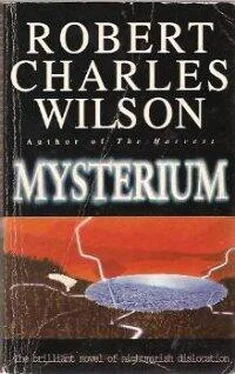“I don’t understand,” Clifford said, quite truthfully.
“See that you don’t.”
“Luke!” His mother, from down the hall. “Come on!” The soldier winked at Clifford and left the room.
∞
Since September, classes at John F. Kennedy had been reduced to two days a week. Dex supposed the futility of it had become obvious: nobody at JFK High would be going to Harvard or MIT, not this year or next year or ever. The only thing he was giving these kids was an illusion of normalcy, and maybe that wasn’t a good or useful commodity anymore… maybe it was even dangerous.
His afternoons were free. He had spent the last two afternoons reading Linneth’s history book and today he decided to discuss the contents with Howard Poole. The pressure on Howard had relented over the last few weeks; the Proctors seemed suddenly less anxious to pursue the mystery of the research lab. A daylight visit was possible. Still, Dex took precautions on his way to the Cantwell house. He walked past Oak Street to Powell Creek Park, then doubled back and approached the house from the south.
Howard had been bolder about his Cantwell identity lately. The neighbors seemed to accept the masquerade, or at least none of them had reported him to the militia. But the neighbors were aware of him: they watched, Howard said. People living on the military dole, confined to their houses by fear and bewilderment, had little to do but stare out the window. Dex felt their eyes as he crossed the brown front yard between scabs of ice. He walked quickly between the hedge and the side wall to the back door. He knocked and waited, shivering under the bulk of his jacket. The day had started cold and never warmed up. The last thing this town needed, he thought, was a hard winter. But it felt like a hard one rolling in.
Howard opened the door. Howard wore a threadbare blue sweater, the tail of a white shirt peeking out under the hem. His blue jeans were grimy and he wore gloves on his hands. He waved Dex in and led him to the kitchen. The Cantwell house had been equipped for oil heat, of which there was none, but Howard kept the interior doors closed and the electric oven running, so the kitchen, at least, was passably warm.
Howard offered coffee. “You can get coffee on the ration card now. But I’m still using up what was in the cupboard. It’s a little stale but there’s plenty of sugar.”
Dex nodded and sat at the small table while Howard measured water into a carafe and fed it into the coffee machine. Now that the power was back everyone had these toys to use: coffeemakers, blenders, microwave ovens. The appliances seemed newly frivolous—almost sinful, after months of privation.
“I think he might still be alive,” Howard said. “I’ve been thinking it over, and I believe that’s a real possibility.”
“Slow down. Who’s alive?”
“My uncle,” Howard said impatiently. “Stern.”
And Dex sighed. Every time he came here Howard talked about his uncle. His uncle, the genius loci of the Two Rivers Physical Research Lab, the mysterious Alan Stern, and who the hell knows, Dex thought, maybe the guy was an important part of what had happened out there. But it had begun to look like an obsession, and Howard himself, gaunt and long-haired, had begun to look obsessed.
Last week he had told Dex about his trip to the Ojibway reserve. There had been apparitions in the woods, Howard said. Which was far from impossible. Dex had ceased passing judgment on the operating rules of the universe. Plainly, the universe was a stranger place than he had imagined. He could accept the possibility of luminous beings out in that scrubby old pine forest. But it seemed equally plausible that Howard had hallucinated the whole episode. Howard had been through a lot, hiding from the Proctors in a basement all summer, enduring a long bout with fever. Maybe Howard’s window on reality had clouded a little, and if so, who could blame him?
Howard said something about a telephone. Dex, impatient, took the history book out of the pocket of his coat and dropped it on the kitchen table. Howard stopped talking and stared at it. “What’s that?”
And Dex explained.
“All right,” Howard said. “Okay, that could be important. Have you read it?”
“Uh-huh.”
“Learned anything?”
“Well, it’s not exactly the Oxford History of the World. You want a summary? It starts with the Garden of Eden. Adam gets a human body from the Archons—”
“The which?”
“Archons. Minor gods. Adam is psyche and Eve is spirit and the serpent isn’t necessarily the bad guy, but after that it’s fairly straight Genesis all the way to Moses and the pharaohs. Egypt, Greece, and Rome are presented as fairy tales—Romulus and Remus and the genius of Plato and so on, but at least it’s recognizable.” He accepted a cup of coffee. Howard sat opposite him, wide-eyed, listening intently. “It starts to go wrong around the second century. Valentinus is the Great Christian; Irenaeus is the persecutor of the faithful. The conversion of Constantine never happened. Rome was a seat of classical paganism until at least the 800s, and there are hints that Hellenic paganism is a vital religion even today—at least, in certain unenlightened foreign countries. Christianity didn’t dominate Europe until the Age of the Heresiarchs, approximately the thirteenth century, when a number of hostile churches were unified after Europe was conquered by a Gallic king. By this time, of course, it’s not what you or I would call Christianity. It’s wildly syncretic and it has a huge library of apocryphal books, all Holy Writ, more or less.”
Howard took the volume from the table and leafed through it. “Still, the similarities are so broad…”
“The movements of peoples, the evolution of language. It’s as if history wants to flow in certain channels. Broad ethnic groupings persist, and there are roughly analogous wars, at least up until the tenth or eleventh century. There are plagues, though they follow different patterns. The Black Death depopulated Europe and Asia no less than five times. The colonization of the New World was delayed. Technologically, they’re maybe fifty or sixty years behind us. In terms of population, a century or even two.”
“Talk about the religion,” Howard said.
“There’s nothing very explicit in the book, but it hints at some very strange things.”
“You said ‘Archons’…”
“Uh-huh. And somebody called Sophia Achamoth, and the serpent as a kind of benevolent teacher smuggling out secrets from Heaven—”
“It sounds like Christian Gnosticism.”
“I don’t know a lot about that.”
Howard took his cup in both hands and rocked back on the legs of his chair. “Before Christianity was unified in the Hellenic world there were various schools of Christian doctrine, all kinds of books claiming to be narratives of the life of Jesus or secret keys to Genesis. The New Testament— our New Testament—is what was left after orthodox bishops like Irenaeus purged the texts they disapproved of. Some of these Christian mystery cults were pretty strange, from our point of view. They believed in scripture as a kind of coded message; you were enlightened when you penetrated the mystery. So they were called Gnostics—the ones who know. Valentinus was a major Gnostic figure.” He sipped the coffee, made a face, spooned in more sugar. “I suppose, in this world, the Gnostic churches were never suppressed. They became the dominant strain of Christianity.”
“Okay.” Dex stared across the table. “So how does a graduate physics student know so much about Gnosticism?”
“From Stern,” Howard said. “He talked about Gnosticism all the time. He was obsessed with it.”
Читать дальше












